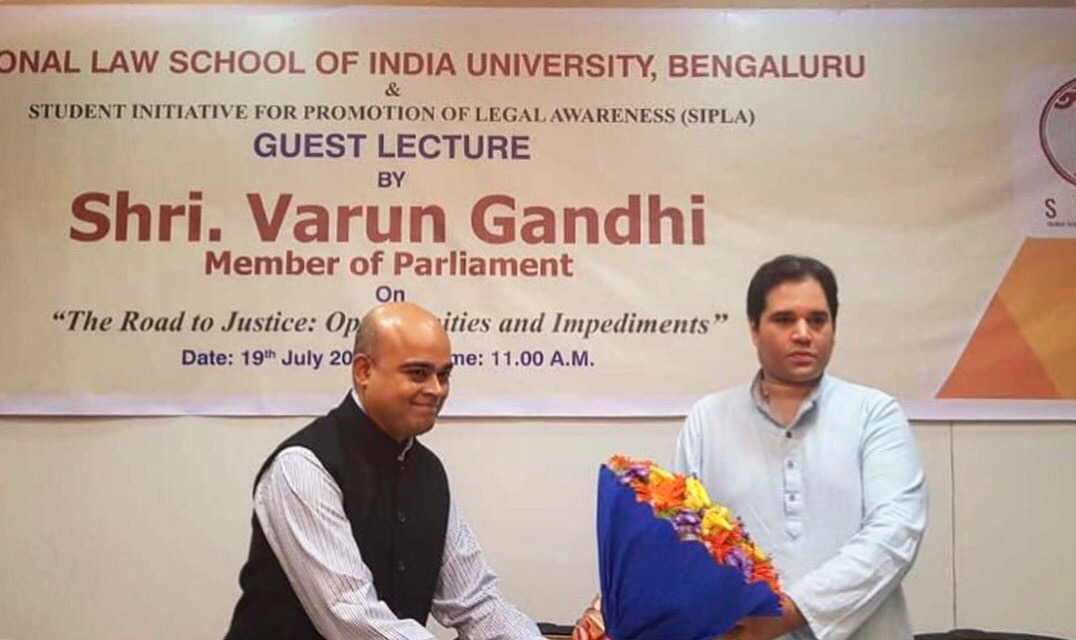This piece has been written by Radhika Goyal (Batch of 2019).
Law School recently had the unenviable privilege of hosting Feroze Varun Gandhi, Member of Parliament of Sultanpur, Uttar Pradesh. It was one of the rare occasions that our campus, usually far removed from the everyday invasion of politics that is rampant in spaces like Delhi University, felt the effects of the political reality of today’s India.
Varun Gandhi comes from a lineage that is as much a boon as it is a curse. His grandmother, Indira Gandhi, imposed the Emergency in 1975, which gave immense power to the State over the liberty of the individual. It gave a free reign to his father, Sanjay Gandhi, to implement some of the most egregious policies in Indian history. The most famous of these being the forced sterilisation of economically backward Indians at the behest of World Bank’s population reduction agenda. A blunder of massive proportions, which took behind India’s population debate by decades. After his father’s death, his mother, Maneka Gandhi cut her ties with Congress to join the Bharatiya Janata Party for whom she currently serves as the Minister of Women and Child Development. It was she who, post the 2012 Delhi gang rape, pushed for the controversial amendment of the Juvenile Justice Act, which tries juveniles of the ages 16-18, who commit heinous crimes, as adults. Varun Gandhi himself came under the scanner when he sought to fashion himself as a Hindutva Leader in 2009 and was booked for hate speech against the Muslim community for statements such as comparing a Muslim leader to Osama Bin Laden.
Needless to say people in law school had opinions. A professor, known for her radical left stance, was appalled that Law School couldn’t have chosen someone better than Varun Gandhi to lead a discussion on The Road to Justice and posted so on social media. A majority of lawschoolites, however, believed that all ideas, even intolerant ones must be engaged with and defeated, if need to be, in the larger marketplace of ideas. Others were certain that no harm would arise out of this event since, lawschoolites aren’t so simple minded that they’ll actually get triggered by a rabble rouser like Gandhi. More importantly, however, this was a chance for students to actually question someone like him and hold him accountable for his politics.
Over the years, Varun Gandhi has made an effort to portray himself as progressive, a task often proven difficult, given his tendency to continue to defend his lineage. He recently tweeted a description of Sanjay Gandhi’s legacy as having created the single largest post independence industry, Maruti, and gifted it to the nation – completely ignoring the fact that the project was rocked with financial controversy under his control and abandoned before the Japanese company Suzuki restarted it, turning it into what Maruti is today (Though it is a company with very problematic attitudes towards labour). As part of this image building, Varun Gandhi has visited various campuses to undertake a youth outreach programme. This event was then a part of his larger political agenda, both individually and for his party.
However, many of us still believed that if, at the talk, Varun Gandhi would be held accountable for his many statements and ideas, it would still be a win for “the progressives.” Unfortunately, we discovered (as liberals often do) that our commitment to free speech might not be respected by those who we were extending the same to. According to an email sent to the student body, questions would be moderated by the Vice Chancellor, for number of questions, follow-ups, etc. An ex professor recounted how in a similar incident many years earlier, a group called Indians for Merit had made a presentation in law school which spoke about upper castes being discriminated on the basis of reservation and when he tried to ask them a pointed question, he was shut down by the then Director. It was possible this event would not be different.
Moreover, even without formal moderation, the presence and support of the Vice Chancellor, Registrar, and other faculty members at the event could act as a deterrent for students. Though Varun Gandhi had reached out to the Vice Chancellor himself, the institution had no qualms in extending full support.
When the event finally rolled by, it was an underwhelming experience. Most of my batchmates didn’t even attend the event (although I suspect it was more out of complete disinterest than any active stance taken against him). He spoke on the usual checklist of topics such as healthcare reforms, electoral reform, women’s safety, and economic empowerment. At one point, however, cracks in his progressive demeanor became visible where he recounted the story of the rape of a girl in his constituency with all the click-baity gruesome details, and then expressed his shock at how the accused would not be tried since he was a juvenile – a classic tactic used by those who intend to dilute child rights by bringing them in conflict with women’s rights. He went on to claim that if you are old enough to rape, you are old enough to be in Jail. He also received a mild round of applause after this story, leaving me horrified on behalf of all the child rights activists, many of whom belong to our university and have persistently objected to this dilution of India’s international obligations under the UN Convention on Child Rights.
When it was time for the Q/A session, despite the fact that no moderation took place on the actual day of the event, no one (myself included) asked any serious questions or contested any argument, and perhaps more than one person left the room warming up to both Varun Gandhi and even to the BJP. Post the event he was felicitated by our University and was also given the honor of planting a tree. Our campus now features trees planted both by Rahul and Varun Gandhi, the poor man’s Kane and Abel! The next day we featured on Varun Gandhi’s Twitter page, a small piece in his larger agenda. The heading was “Sheer privilege to give a lecture at the prestigious National Law School of India University in Bangalore. Along with their superior intellectual capacity, all present were extremely generous in their reception.” Two separate articles appeared in the Deccan Herald, highlighting his talk and his association with the prestigious National Law School of India University.
As far as tragedies go, I admit this is a mild one. And yet the fact is that NLS for all of its supposedly progressive values ended up with an unqualified endorsement of Varun Gandhi. A large part of this is simply because we as a student body are relatively out of touch with politics as compared to most universities. But even the limited discussion that took place before the event, was entirely about Varun Gandhi’s right to free speech. When framed in these terms, the issue became about censorship or not providing a platform, and the problems with that. There was no room left for criticizing this event, without being perceived as saying that the event should be canceled. Instead, had we asked questions on the impact of having such a speaker on students, or whether such a positive association made us part of a larger right wing narrative, I believe that we would have had a much richer discussion. This misplaced focus on free speech also explains why when it was rumored that there might be moderation, a lot of people were up in arms about their free speech being threatened, but when given the chance, we didn’t really have any questions. In fact, even if people had actually come out in defence of Varun Gandhi and his ideas, it would have opened up various avenues of discussion that were muddled up by making the whole issue about free speech.
It is true that for every Varun Gandhi, we will still have the many Soni Sori’s and Rajdeep Saredesai’s who visit campus. And yet the fact that we allowed even one Varun Gandhi to leave campus entirely unchallenged, is perhaps something that we as the student body should reckon with. With the 2019 General Elections fast approaching, and intolerance reaching an all time high in our country, I believe we at NLS cannot afford to be depoliticized any more. It is time we take stock of that.


Comments